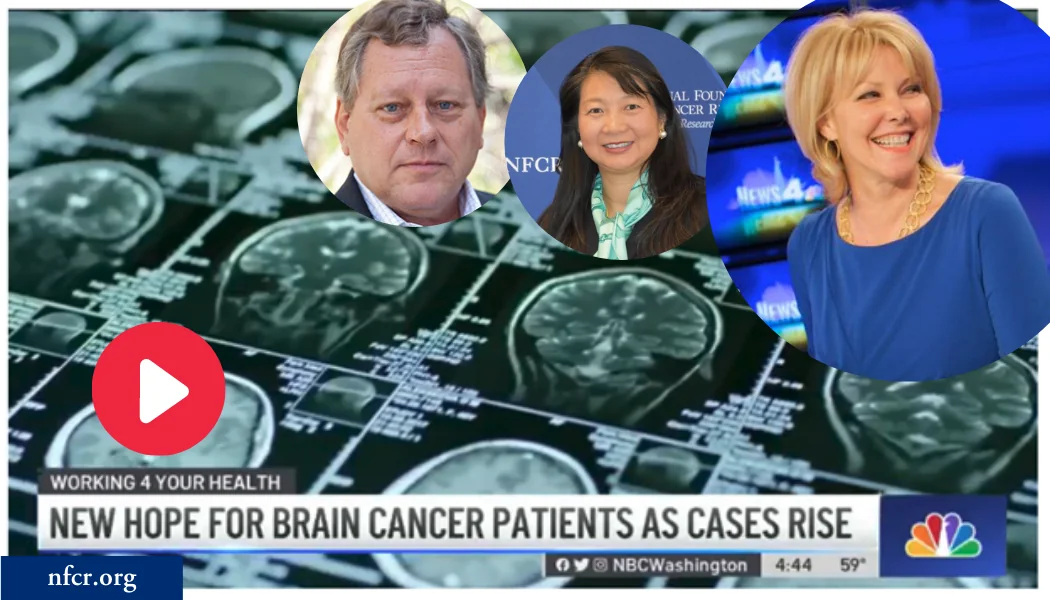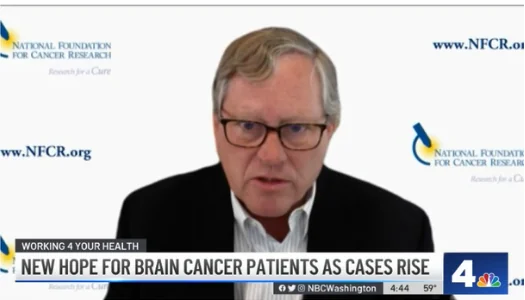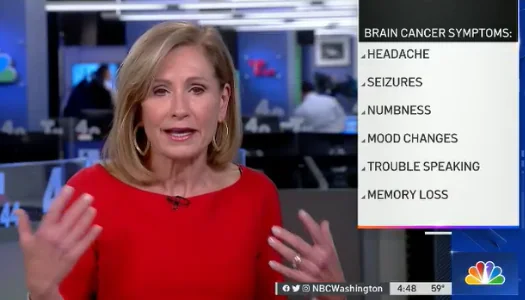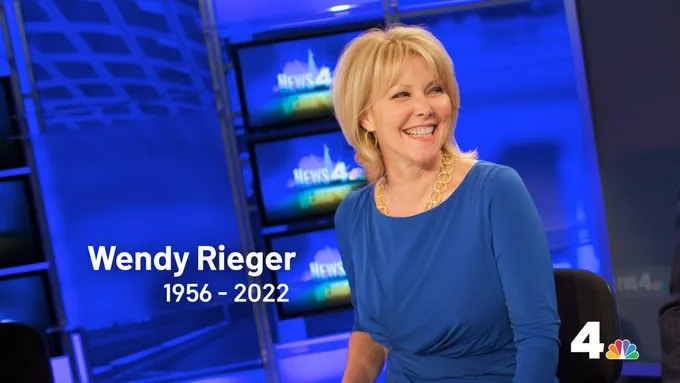NFCR In the News: Addressing Deadly Brain Cancer, GBM

On Wednesday, April 20, 2022, National Foundation for Cancer Research (NFCR) CEO Sujuan Ba and Scientific Board Chairman Web Cavenee joined NBC4 Washington’s Doreen Gentzler to talk about the passing of beloved journalist Wendy Rieger.
Rieger passed on Saturday, April 16, 2022, after a battle with brain cancer. She faced glioblastoma, the deadliest type of brain cancer.
Speaking about glioblastoma, Cavenee shared, “It’s lethal because of several things. One, it grows very rapidly. Second, it is resistant to almost any type of therapy — radiotherapy or chemotherapy. And third, it moves through the brain.”
Ba went on to add, “GBM is one of the most deadly diseases, and patients cannot wait. We have people dying, yet the traditional clinical trial system takes too long.”
Glioblastoma is known to be challenging to detect and treat. Unfortunately, the average five-year survival rate is only about 7%. GBM AGILE shows promise in changing these facts.
GBM AGILE is an innovative clinical trial platform that accelerates the evaluation of new treatments for glioblastoma. By efficiently testing multiple drugs and drug combinations simultaneously, GBM AGILE serves as a patient-centered initiative improving treatment options and success. The AGILE trial design is expanding to support patients with other rare cancers and diseases.
Without NFCR’s $3 million initial funding for the GBM AGILE platform, this new process for accelerating treatment options for cancer patients would not be thriving today. We believe this will be the future of cancer research and treatment development. Donate today to be a critical part of this change >>
Read More From Our Interview with NBC Washington here or watch the interview below:
Read the key highlights from this interview below:
As reporter Doreen Gentzler mentions, ‘A crushing diagnosis…glioblastoma is an aggressive and deadly brain cancer. There is hope though and important research going on.”
Gentzler goes on to share how challenging it can be for patients to find and enroll in clinical trials. In addition to NFCR’s GBM AGILE efforts, we have launched a Patient Assistance Center that is focused on improving education around clinical trials and highlighting opportunities. With this, we hope to connect more individuals with the right opportunities for themselves or a loved one.

In discussing what typically follows a patient’s brain tumor surgery, Gentzler provides a stark reminder that. “The tumor almost always grows back and carries a grim prognosis.”
Further, Cavenee explains that, “Many [people who are diagnosed with a brain tumor], if not most, will succumb within the first year or two.”
This devastating fact hammers home the importance of NFCR’s work to help launch and amplify the GBM AGILE platform.

“This whole process is hundreds of researchers and physicians who want to provide hope to these patients and to make this terrible situation maybe a little bit better. Hopefully we will find something that will solve this problem.”

An important takeaway for anyone is to know and lookout for the symptoms of potential health problems. In this interview, Gentzler discuss possible symptoms of brain tumors. Noting an important caveat that symptoms can vary greatly person-to-person and by tumor location in the brain. “Headaches, that’s what Wendy experienced. Some may not have any symptoms.” For more information on signs and symptoms, visit NFCR’s brain cancer information page.
Gentzler concludes the interview by sharing important advice. “Don’t ignore symptoms because it might be something. As Wendy said, ‘You have to advocate for yourself and your own health.’”
Please make a gift today in honor of Wendy Rieger and anyone who has or will face a brain cancer diagnosis in their lifetime. Together, we can accelerate cures to make cancer history.

NFCR is committed to addressing unmet needs in the cancer community. We also invest in researchers determined to combat the deadliest cancers, even when they are seen as high-risk projects. Our approach aims to increase the impact on cancer patients and their families by eliminating obstacles faced by other funding sources.
For more information about enrollment in GBM AGILE, please contact patientinfo@gcaresearch.org or call 310-598-3199.
In the last 20 years, NFCR has invested more than 8 million dollars into brain cancer research. You can help accelerate cures for brain and other cancers when you make a gift today! >>
A world without cancer is possible. Help us turn lab breakthroughs into life-saving realities.

5.7 Million+
Donors who have fueled NFCR’s mission

$420 Million+
Invested in high-impact research & programs

36+ Labs & Hundreds of
Nobel Laureates & Key Scientists received NFCR funding, driving breakthrough research












